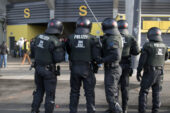European police authorities have numerous applications for communication and information exchange. Member States are now developing another platform for large-scale police operations and terrorist attacks. The European domestic secret services have a similar system.
Several European police authorities are developing a new system for the exchange of information in real time. Under the name “Quick Response for Operational Centers” (QROC), the affiliated units are to coordinate their response following a terrorist attack. The instrument could also be used to provide support in case of major events and crises. Several Member States are currently looking for appropriate solutions, and corresponding efforts are also being made in the context of the Corona crisis.
According to the project’s website, the exchange of data on events and persons possibly involved could subsequently be carried out via the so-called “Swedish Initiative”. The Council Framework Decision of 2006 sets short deadlines for the cross-border transfer of personal data. It would also be possible to use the Prüm Framework, which enables the responsible services throughout Europe to query biometric data or data on vehicle owners.
Video surveillance and drones
Each EU member state should designate a contact point for QROC. In addition, they should establish a “Community of European Operational Centers”. In order to prevent the connected situation centers from drowning in “data flows”, QROC should seek new methods of filtering and decision-making. These are called 5G and newer “data management technologies”. The control centers will receive images from video surveillance and drones, among other things, for the joint search for suspects.
QROC is a project of the “European Network of Law Enforcement Technology Services” (ENLETS) working group, in which the police technology departments of all EU member states and Switzerland are networked. It is not a structure of the EU Commission, but of the Council. The Council Working Group on Law Enforcement in Brussels is responsible for supervision. The project also includes training in response to a terrorist attack. Training curricula and materials will be provided by the EU Police College CEPOL.
The developers of QROC include police forces from Ireland, Luxembourg, Poland, Spain, the Netherlands, the Czech Republic, Romania and Greece. Several research institutes from the Netherlands, Cyprus and Spain are also involved. If the EU Interior Ministers decide on a regular operation of the new application, it is planned that it could be hosted by the European Agency for the operational management of large-scale IT systems (eu-LISA).
“WhatsApp for law enforcement officers”
With the Schengen Information System, European police forces and secret services already have a platform for sharing information, but without real-time functionality. Although the encrypted SIENA network at Europol offers the possibility of rapid exchange of information, this is only available to different working groups or networks. However, a group that only communicates in the event of terrorist attacks or large scale crisis does not exist at the European Police Agency. Europol, however, operates the “Virtual Command Post” (VCP) system for “accompanying emergency forces in special situations”. Emergency forces can be located and addressed from a situation center.
The results of QROC could also be implemented in the “WhatsApp for law enforcement officers” project. In all EU member states, the responsible officers are to be equipped with mobile instant messaging software “for operational purposes”. The apps should have end-to-end encryption or only communicate via servers controlled by national governments and/or EU institutions.
Europol has developed a similar application in 2016 with the “Operational Real-Time Collaboration Solution” (ORTICoS). This enables investigators to “coordinate quickly and securely” via their mobile devices in the event of a joint operation. According to the German Ministry of the Interior, the technology “was not accepted by the target group, however,” as it proved “not sufficiently practicable”.
Similar platform of secret services
At the end of the project, the European police chiefs will be informed about the results. A presentation will also be made to the Standing Committee on Operational Cooperation on Internal Security (COSI). There the EU member states coordinate their police cooperation in the areas of law enforcement, terrorism, border controls, judicial cooperation and civil protection.
The COSI is also responsible for dovetailing police and intelligence cooperation. Because the European Union has no mandate for the coordination of intelligence services, the work of the COSI, true to its official presentation, only concerns strategic questions of cooperation. However, Europol also cooperates with the domestic secret services of all member states in joint “tabletop exercises”. Such events are also planned in QROC.
Within the framework of the “Counter Terrorism Group”, the services created a real-time platform for exchanging information four years ago in The Hague. With QROC, a similar structure is now emerging at police level. It is quite possible that the two platforms will grow together in a few years. At the EU level, ideas are already circulating for the creation of “fusion centers” with police forces and intelligence services.
Image: QROC.





Leave a Reply